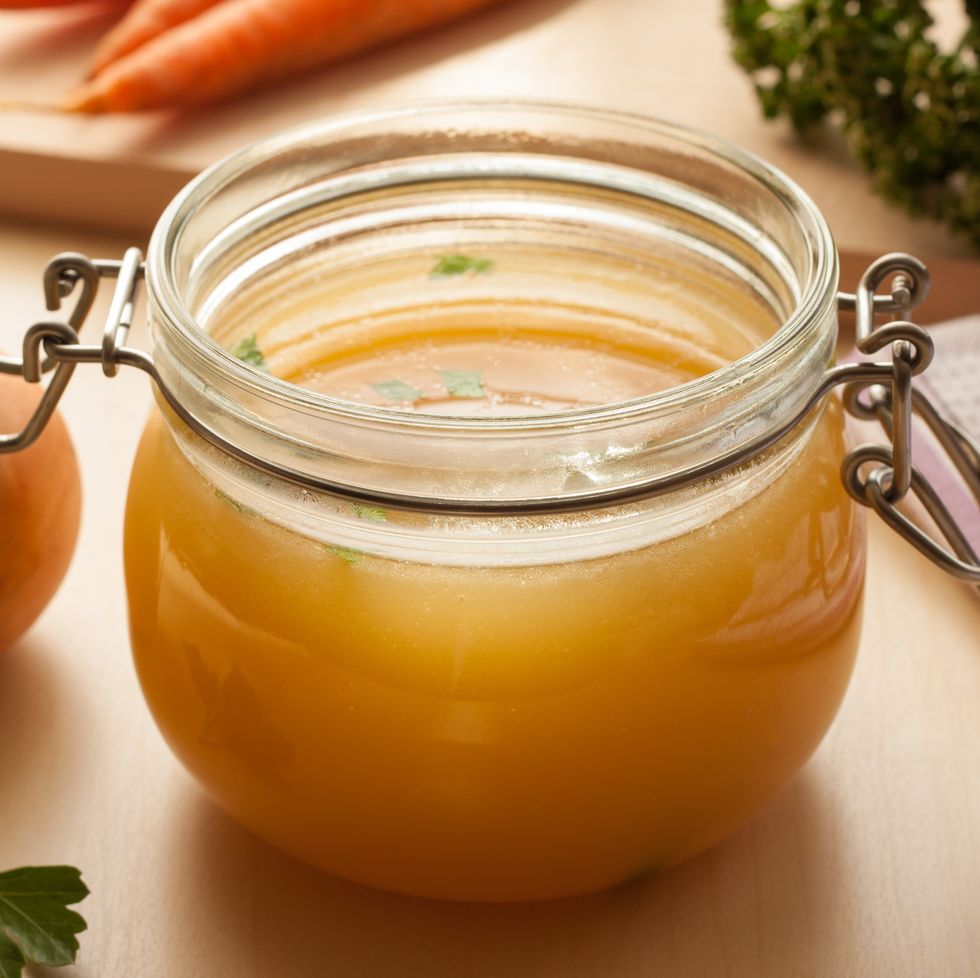
Dialing in your nutrition is as important as your training when it comes to powering your runs. So what runner wouldn’t appreciate a superfood that can give them an edge?
Bone broth has been hyped as a health elixir for years, and with good reason: It’s packed with ingredients that can strengthen your joints and ligaments, help you refuel, and aid in post-run recovery. But what is it, exactly?
“Bone broth is that liquid that’s left over after simmering animal bones and connective tissue (from chicken, beef, turkey, pig, or lamb) over heat,” says Sarah Schlichter, R.D.N., owner of Nutrition for Running. “It provides an array of nutrients, including electrolytes like sodium, magnesium and calcium, as well as Vitamin A, Vitamin K2, iron, zinc and omega-3 fatty acids, all of which are dependent on the animal marrow that’s simmered.”
Anyone can benefit from bone broth’s nutrient makeup, but runners have been swigging this stuff at aid stations in endurance events even before it went mainstream. (And Mets’ pitcher Noah Syndergaard, who underwent Tommy John surgery in March 2020, drinks it as well!) Here’s why.
How does bone broth help runners?
Bone broth’s main ingredient is collagen, says Katie Kissane, a registered dietitian at UCHealth in Colorado and owner of Fuel 2 Run.
“Since collagen is made of connective tissue and amino acids that are important in the building of our own joints and ligaments,” she explains, “it’s thought that taking collagen helps us strengthen these tissues.”
Running can be tough on your soft tissues and joints; a 10-minute mile, for example, consists of 1,700 steps, each one producing ground reaction forces about two and a half times your body weight. Collagen, which also contains an anti-inflammatory amino acid called glycine, says Kissane, can be a welcome nutrient in bulletproofing your body against some of that impact.
“While you can get collagen from your diet, those with a poor diet or who deal with constant injuries may want to consider additional collagen,” says Schlichter.
Athletes who supplemented with five grams of collagen peptides per day for 12 weeks saw a statistically significant improvement of activity-related joint pain, a 2017 study published in the Journal of Applied Physiology, Nutrition, Metabolism found; additional research published in the Journal of Clinical Nutrition that year found that consuming five to 15 grams of collagen resulted in an increase in collagen content and synthesis and improved mechanics.
There’s one catch: Bone broth may not provide the same consistent amounts of collagen as a collagen supplement would, according to a 2019 study published in the International Journal of Sport Nutrition and Exercise Metabolism. Still, “there’s certainly no harm in adding bone broth to your diet and, if anything, you could see benefits and receive additional nutrients as a result,” says Schlichter.
How to incorporate bone broth into your everyday diet
Since bone broth is a liquid, it’s an easy add to any diet. You can use it as a base for soups or sauces, use it in your post-workout smoothies, and even drink it like hot tea.
To make your own bone broth, just place the animal bones of your choice (i.e. the leftovers from a roast chicken dinner) in a large pot with water and some spices of your choice—sea salt can boost the electrolyte benefits, for example—and simmer for 12 to 24 hours, says Schlichter. Some people also like to add other liquids for flavor, such as apple cider vinegar or coconut milk, she adds.
If that seems like too much of a time commitment (or out of your kitchen skills repertoire—no judgement!), there are plenty of bone broths you can pick up in grocery stores.
You don’t need to consume a lot in one go to get the benefits. Kissane suggests having somewhere around 10 to 20 grams per day—one to two cups. “About 10 grams is a standard dose,” she says.
The best time to have those cups would be before or ofter your workout. The naturally occurring electrolytes you get from bone broth—like sodium, potassium and magnesium—make it a solid hydration choice pre- or post-workout. Plus, it can contain various amounts of protein, which could help with decreasing muscle protein breakdown after a workout, says Schlicter.
Just don’t count it as part of your daily protein needs, says Kissane—“it’s not a complete protein, so it doesn’t contain all of the essential amino acids,” she explains. Instead, think about pairing it with another protein source and carbohydrates to enhance post-workout recovery.
Just remember, “as with anything, bone broth is not a cure-all or magical solution to a ‘healthy’ diet,” says Schlicter. If you’re looking to strengthen your muscles and connective tissues and boost your recovery, “habits and behaviors always count as well!”